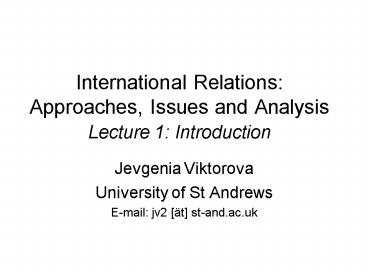International Relations: Approaches, Issues and Analysis Lecture 1: Introduction - PowerPoint PPT Presentation
1 / 14
Title:
International Relations: Approaches, Issues and Analysis Lecture 1: Introduction
Description:
International Relations: Approaches, Issues and Analysis. Lecture 1: ... Method(ology) Debate about methods largely implies a debate about substance. Hypothesis ... – PowerPoint PPT presentation
Number of Views:1748
Avg rating:3.0/5.0
Title: International Relations: Approaches, Issues and Analysis Lecture 1: Introduction
1
International Relations Approaches, Issues and
AnalysisLecture 1 Introduction
- Jevgenia Viktorova
- University of St Andrews
- E-mail jv2 ät st-and.ac.uk
2
Introduction
- IR as a discipline
- on the nature of knowledge of the social
reality of international relations - origins of the discipline
- Instruments of knowledge concepts,
theories, methods etc. - Analysing international relations
- issues and levels of analysis
- agents, structures and processes
- orders of discourse
3
International Relations (IR)
- A discipline of social sciences?
- international relations as its subject matter
- What is international relations?
- IR is about diplomatic and strategic relations of
states - IR is about cross-border transactions of any
kinds, by a variety of political, economic and
social actors - essentially contested nature of IR concepts
such as politics or power etc. - Lack independent essential existence in the
world - A matter of convention
- inter-subjective rather than objective
- IR theorising is not politically neutral there
are political implications of choosing one or
another definition of IR
4
IR (continued)
- Language of the discipline of IR is largely the
same ordinary, natural language - obscures the distinction between the
object-language and meta-language which
belong to different orders of discourse - metadiscourses are simply those that are defined
by the fact that they speak about other
discourses, and this realm is in principle
infinite, like a hall of mirrors. Every set of
claims within a practice or discourse allows, in
principle, another set of claims about it.
(Gunnell 1998 21)
5
IR (continued)
- everyday and self-evident categories of
language are in fact socially and politically
motivated - reflect a particular view, understanding of the
world (cf. Sapir Wharf hypothesis language
determines perception of the world) - one cannot think outside theory
- any judgement or statement of fact relies on
certain ontological and epistemological
assumptions - Definitions and terminology
6
Theory
- reflective thought
- a frame of thought
- a perspective a lens through which one
observes/ approaches reality - theory in different perspectives of IR
- theory vs. model
- Sources of development of IR theory in response
to political events, or to developments in the
discourse of IR as an academic discipline? - grand theory
7
IR theories
- a plethora of theories dealing with various
aspects and issues of international relations - IR theories as broad traditions of thought
sharing some core features or ideas, or schools
of thought - convention
- the conventional headings of IR theories are
often misleading
8
The contested nature of IR
- attempts to produce theory on the widest canvas
available to us not simply a theory of politics
in one country or continent, but a theory of
global relations. This means any worthwhile
theory of international relations is going to
have to be able to work with a multiplicity of
cultures, with the aim of providing an account of
the world that is not ethnocentric. What this
involves in practice is the ability to keep in
play a number of competing conceptions of how
things are, without giving in to a temptation
to close down debates and reach premature
conclusions, or allow any one account of
international relations to structure the whole
(Brown 2005 12 15)
9
Some useful terms
- Concepts
- Levels of analysis
- Individual
- Unit National/ State Group
- System International Global
- Sub-system Regional (macro- and micro-regional
both sub-national and transnational)
Supranational
10
Some more useful terms
- Epistemology
- Ontology
- Method(ology)
- Debate about methods largely implies a debate
about substance - Hypothesis
- structure agency process
- structuration
11
Origins of IR as a discipline
- theorising is about deliberating on questions
that defy simple and uncontested answers or
explanations - the causes of war?
- Before WWI, the academic study of international
relations in an embryo - War as motivated by gain
- WWI shook this belief
- ?the necessity of theorising international
relations
12
Lecture topics 2-6
- Lectures 2 and 3 traditional or mainstream
IR (liberal and realist theories) - (2) classical IR up to the late 1960s-early
1970s - (3) contemporary IR from mid-1970s to present
- (4) constructivist IR
- (5) critical and post-structural IR
- (6) post-Cold War challenges to IR theory
13
Seminars
- Four 3-hour seminars
- Student presentations
- Comments
- Discussion
- Topics
- Power
- State and non-state actors
- Conflict and war
- Identity
14
Assessment
- Attendance?
- Seminar participation (30 of the mark)
- Exam for Bachelor students (late February)
- One general question about IR
- A choice of one from three narrower questions on
specific issues, agendas or approaches - 18-page (approximately 3000-3500 words) essay for
Master students on a topic of your choice
(deadline TBA)































